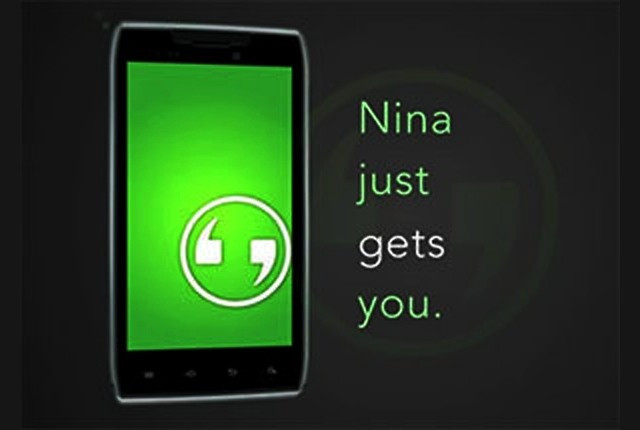Human Interaction Under Threat from NINA – the Virtual Assistant
Nuance expands its virtual assistant to the web, as human interaction looks likely to become a thing of the past.

You may not know Nina yet, but you could soon find yourself talking to her multiple times every day, telling her your most intimate financial and personal details.
Nina comes in many shapes and sizes, she is American, British, Italian and even French. She have ben small, tall; black or white - Nina can even be a man.
Nina is the virtual assistant from voice recognition experts Nuance which is set to power apps on your mobile phone, and from today, customer service systems across the web.
Nina stands for Nuance Interactive Natural Assistant and was launched on the iOS and Android platforms last August, allowing businesses to integrate the sophisticated voice recognition and natural language engine into their apps.
Aimed at sectors like banking, hospitality and retail, the system allows users to bypass the traditional maze of menus and sub-menus traditionally associated with automated customer service systems.
While many companies are striving to keep a human face in all aspects of their business in the face of such widespread automation, Nuance is looking the other way.
Expansion
Speaking at the launch of the expansion of Nina in London, Sebastian Reeve, Director of Product Management for EMEA, said that people are moving more towards self-service when it comes to these types of interaction.
He highlighted research from the Hyatt group of hotels which said that one third of its guests now checked in through self -service kiosks in the lobbies of their hotels, eschewing the traditional reception desk.
When Nuance looked into what was driving this change of behaviour the major factor they found was time.
While time may be the deciding factor for customers, for businesses the huge cost savings associated with automated customer services like this are the biggest driving factor.
Reeve said that Nuance's system allowed for customer service delivery at 10 percent of the normal cost, which makes it an easy decision for businesses provided that the service works - and Nuance claims it does.
Major companies
Nina is currently in use by several major companies in the US, though Nuance has yet to announce its first UK or European partner. Reeve said the company was in advanced talks with companies in this part of the world but couldn't comment on when these deals may be announced.
When asked which secotrs it was seeing interest from, Reeve gave the example of airlines and pizza company which had been in talks with Nuance.
On mobile, Nina allows for the removal of passwords, replacing them with biometric scans of your voice, using a predefined pass phrase. It also allows for the removal of multiple steps within the app itself, letting you speak naturally to your phone, giving it multiple pieces of information at once.
For example, rather than going through several menus, you can simply say: "Pay £100 off my Visa bill next Wednesday." In demonstrations the system works very well, though it will be in real world use that it will need to prove its worth. If users get frustrated or annoyed with the service, they simply won't use it.
Web
Nuance has now brought these features to the web, allowing businesses to create a text-based virtual assistant on their websites. You will have seen multiple examples of this already, in the shape of the "Do you want some help" pop-ups which proliferate many consumer-facing websites these days.
However Nuance that it can offer businesses a multi-channel solution, across mobile, web and on the phone as well. The system also allows for seamless integration with human agents too, meaning more complex and involved requests can be handled by a real customer service agent.
The online version of Nina will be offered with three distinct goals in mind - service, marketing and sales. Each of these will give different response to user inquiries and will drive customers to different parts of your site and business.
The avatars which accompany these virtual assistants can also be tweaked, ranging from comic-book style characters to photo-realistic images whose lips move as they speak.
The system supports 13 text and 38 spoken languages.
Coming to an end
The days of human behind the counter or at the end of a telephone line at coming to an end. As voice recognition and natural language engines become ever more sophisticated, it may soon be hard to distinguish between an automated system and the real thing.
While there are still humans mining the data received by Nuance from its customers, in order to recognise patterns and improve products, Reeve said that with the exponential increase in cloud computing power and its partnership with IBM's Watson research, Nuance could soon be offering a completely automated service.
This could see Nina monitoring how customers are interacting with a particular app, seeing where any problems exist and tweaking the interface on the fly, without the need for any human interaction.
Indeed, Reeve said that the only thing preventing Nuance integrating this service into every single smartphone at a system level is the processing power available - though considering how quickly that's changing, it may not be long before touchscreens become redundant.
© Copyright IBTimes 2025. All rights reserved.






















